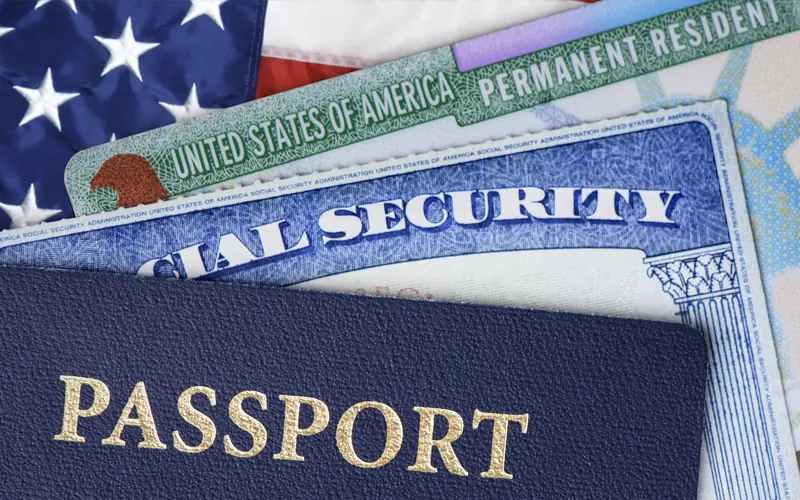Family Based Green Cards
BOOK 30 MINUTE CONSULTATION HERE
($150 Consultation Fee)

What is a Green Card?
A green card is also known as a permanent resident card. This identity document is granted by the United States Citizenship and Immigration Services department (USCIS) to show that an immigrant has permanent residency status.
United States citizens and permanent residents have the right to petition the USCIS to bring their family members into the United States using an immigrant visa known as a Family-Based Green Card. This is the most common type of visa, accounting for 65% of yearly legal immigration.
There are two different categories of family green cards:
- Immediate Relative Immigrant (IR) Visa
- Family Preference Immigrant Visa
BOOK 30 MINUTE CONSULTATION HERE
($150 Consultation Fee)
CONTACT US
Immediate Relative Immigrant (IR) Visa
The immediate relative visa is for immigrants who are looking to re-unite with members of their nuclear family — meaning their parents, children, or spouses, who are U.S. Citizens. The immediate family members who are adult U.S. Citizens sponsor the immigrant family members, then they apply for the visa before immigrating, and once their application is approved, they are subsequently permitted to move to the United States.
There is no annual limit on the number of these visas that get approved, unlike other types of visas. Immediate relatives of U.S. citizens have priority over other types of visas which may have to wait for a number to become available.
Immediate Relative Immigrant visas can be issued to the spouse of a U.S. citizen, the unmarried child, or children under age 21 of a U.S. citizen, an orphan adopted abroad by the U.S. citizen, an orphan that is going to be adopted by a U.S. citizen, and parents of a U.S. citizen who is aged 21 or older.
The process for applying for entry to the United States via an Immediate Relative Immigrant Visa is:
- The U.S. Citizen relative desiring to sponsor their immediate family member files a USCIS form petitioning for their family member. When that is approved,
- the National Visa Center (NVC) will contact you with further instructions regarding documents and fees,
- an interview is scheduled with a consular officer,
- background checks are run and a decision will be made, and
- once the immigrant visa is approved, the family member receives a passport with a United States visa that has an expiration date.
- The immigrant family member pays a green card fee. They become a permanent resident when they enter the U.S. and the green card will be mailed to them at the U.S. address they provided.
If the family member wishing to obtain residency using an Immediate Relative Immigrant Visa is already in the United States, it is a matter of filing different documents, with the caveat that they must be in the country legally with no previous violations of immigration or criminal law.
BOOK 30 MINUTE CONSULTATION HERE
($150 Consultation Fee)
CONTACT US
Family Preference Immigrant Visa
The family preference immigrant visa is for non-immediate family members of U.S. citizens or immediate family members of permanent residents. The annual limit for these types of visas is 226,000. You can check availability here The Visa Bulletin (state.gov)
The different types of family preference immigrant visas available are:
Family First Preference (F1)
First preference is given to sponsoring unmarried sons and daughters of U.S. citizens who are 21 years of age or older
Family Second Preference (F2)
(A) spouses and unmarried children younger than 21 years of age of lawful permanent residents and (B) unmarried children 21 years of age and older of lawful permanent residents
Family Third Preference (F3)
Married children of U.S. citizens
Family Fourth Preference (F4)
Siblings of U.S. citizens that are 21 years of age and older
The family member who is the U.S. citizen or permanent resident must petition to bring their immigrant family member over by applying to the USCIS using the correct forms. Afterward, if the form is approved, the case goes to the National Visa Center (NVC), which conducts various screenings, background checks, interviews, medical examinations, and collects any fees.
To summarize, U.S. citizens can petition to bring over their immigrant spouse, children, parents or siblings. Permanent residents can only petition for spouses or unmarried children.

“The most important thing in the world is family and love.” – John Wooden
BOOK 30 MINUTE CONSULTATION HERE
($150 Consultation Fee)
CONTACT US
Overview of General Citizenship Process After Obtaining a Green Card
The steps to becoming a citizen of the United States are called Naturalization, and are as follows:
- Pay the required fees, fill out all of the forms, and find someone to sponsor you in order to get your green card.
- Following receipt of your green card, you will have wait 3 to 5 years (determined by other factors) before you apply for naturalization.
- The naturalization process is then initiated by filing a N-400 form https://www.uscis.gov/n-400 with the USCIS. From there, the USCIS will require you to complete a biometrics screening. Biometrics screenings include the collection of fingerprints, photographs, and a signature.
- Complete an interview. At the interview, you will be asked questions regarding your truthfulness about wanting to become a naturalized citizen and you must pass the Civics and History test.
- Based upon that interview, your Naturalization application will either be granted, denied, or continued. If your application is continued, you may be asked to obtain additional documentation.
- If your application is granted, you will then be asked to take the Oath of Allegiance in a Naturalization Ceremony.

The Importance of Hiring an Immigration Lawyer
Navigating the immigration process can be overwhelming and confusing. Mistakes can set your paperwork back for months, if not more. An experienced immigration lawyer can make all the difference. We know the paperwork required regardless of your particular circumstances and understand what the USCIS is looking for during interviews. In the event of any denials, your immigration attorney can step in as your advocate and dispute the denial as well as correct any issues and get you back on track to obtaining your green card or citizenship.
The experienced team of immigration law professionals at Siri & Glimstad LLP understands the importance of this process and has the tools and knowledge to guide you through it as efficiently as possible.
At Siri & Glimstad LLP, we have represented thousands of clients in immigration matters. Our motto is simple – Dedication, Efficiency, and Commitment to the end goal.
We also handle other types of immigration cases including:
- Adjustment of status cases with and without vaccine waiver
- Consular cases with vaccine waiver
- Emplyment based visas
- Asylum
- Removal of conditions of permanent residence
If you or a loved one need help with any issues concerning immigration, please contact us. Hablamos español.
BOOK 30 MINUTE CONSULTATION HERE
($150 Consultation Fee)

Head of Immigration
CONTACT US
Contact Us
BOOK 30 MINUTE CONSULTATION HERE
($150 Consultation Fee)




